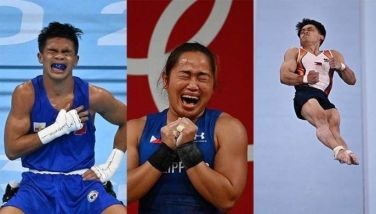Desaparecidos

It is dangerous not to react against a dictatorship. “It starts with police brutality and ends up with people dropping out of planes.”
This may sound familiar, but that’s not a Filipino talking about the Marcos dictatorship. The statement was given to the Washington Post in April 2008 by Hector Marcos (no relation to the Pinoy despot) Timerman, when he assumed his post as Argentina’s ambassador to Washington.
At around the same time that Filipinos were fighting the Marcos dictatorship, similar struggles were taking place in much of Latin America. Timerman was among his country’s most prominent dissidents, thrust into the spotlight when his father Jacobo, publisher of La Opinion, was kidnapped in April 1977 and brutally tortured by the military junta.
Jacobo published the names of thousands of Argentina’s desaparecidos, and he himself became among the “disappeared” in the country’s “dirty war.”
Hector, only 24 at the time, took over the newspaper and continued his father’s advocacy, until the junta seized their family’s assets including the newspaper.
When Hector finally found his father, electric shocks and other forms of torture had taken their toll. Jacobo was detained for 30 months.
Hector left his country in 1978, moving to Brazil, then Israel, and finally to New York, where he met kindred spirits from Asia: Filipinos living in exile in New York, safe from the clutches of Ferdinand Marcos’ martial law regime.
Among the Filipino exiles Timerman remembers meeting were Benigno Aquino Jr. Timerman also remembers applying for political asylum together with Heherson Alvarez. They had the same lawyer, Tom Bernstein.
Timerman’s story was well known in the US and he was granted political asylum. He became a human rights activist, co-founding Human Rights Watch and sitting on the boards of other rights organizations. He wrote articles for US publications including The New York Times and earned a master’s degree in International Affairs from Columbia University in 1981.
He was still in New York when fellow exile Ninoy Aquino returned home in 1983 and was greeted by an assassin’s bullet.
Last Thursday, Timerman, now democratic Argentina’s top diplomat, visited the memorial in the city of Manila built in honor of Ninoy and Cory Aquino, with a statue nearby of the late Manila Archbishop Jaime Cardinal Sin.
The Philippines was Timerman’s second Asian stop after Indonesia, Argentina’s largest trading partner in Southeast Asia. Timerman returned to Buenos Aires Friday night after meetings with officials led by President Aquino.
“I always had great admiration for what (Ninoy Aquino) did,” Timerman told me in an interview Thursday night, arranged by Argentine Ambassador Joaquin Otero.
Timerman noted the similarities in our countries’ histories: colonized by Spain, oppressed by a dictatorship, and then winning freedom.
“We have an obligation, as survivors of a dictatorship, to give help” to people struggling for democracy, he said.
Argentina is pushing, together with France, for a congress on compliance with the International Convention for the Protection of All Persons from Enforced Disappearance. The convention entered into force on Dec. 23, 2010, but 87 countries — the Philippines included — have outstanding cases of desaparecidos.
* * *
Timerman’s job now, of course, is not limited to human rights advocacy. He told me he visited Manila because he appreciated the country’s support for Argentina on its territorial dispute with Britain over Las Malvinas — better known here as the Falkland Islands.
And like several other countries in Latin America, Argentina is also looking at Asia and Oceania for increased trade as the financial crisis persists in traditional markets in Europe and the US.
Argentina is ready to share its expertise in food technology, agro-industry and biotechnology to improve crop yields and boost food security in the Philippines.
Filipino investors may also want to explore possibilities in Argentina. Enrique Razon has been there for years, with his International Container Terminal Services Inc. involved in port operations.
The Department of Tourism may also want to bring its “More Fun in the Philippines” campaign to Argentina. Timerman told me that when Argentines travel for leisure in this part of the world, they mostly pick Indonesia, China, Vietnam, Australia and New Zealand as their destinations.
But apart from strengthening his country’s ties with the world, Timerman is an ambassador of the democratic way of life.
* * *
“Nobody misses authoritarian rule in Argentina,” he told me.
His country is helping societies in transition to democracy in the Middle East and North Africa. Argentina is currently assisting Syrian refugees at the Iraq-Syria border.
“Argentina always supports any peaceful attempt to establish democratic rule,” he said. “We help others to protect democracy.”
As Filipinos know too well, the transition, the strengthening of democratic institutions, can be arduous. I asked Timerman if some Argentines longed for a return to a degree of strong-arm rule.
“We want more freedom,” he replied, pointing out that his country was the first in Latin America to legalize same-sex marriages. “Nobody should be rejected because of his ideas, religion, ethnicity or personal beliefs.”
What can societies in transition learn from Argentina in its rise from authoritarian rule?
“The true way to live is under a democracy,” Timerman replied. “It will take time.”
- Latest
- Trending




























